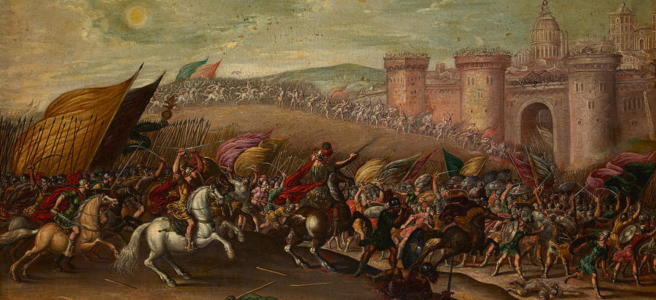Ted Grimsrud—December 11, 2023
One of the more challenging passages in the Bible is the story told in the book of Joshua. God’s chosen people enter the “promised land,” meet with opposition from the nations living there, and proceed—with God’s direction and often miraculous support—to kill or drive out the previous inhabitants. The book ends with a celebration that now the Hebrew people are in the Land, poised to live happily ever after.
Probably the most difficult aspect of the story to stomach is the explicit command that comes several times from God to the Hebrews to kill every man, woman, and child as part of the conquest. This element of the story is horrifying, even more so in light of the afterlife of the story where it has been used in later times to justify what are said to be parallel conquests—such as the conquest of Native Americans and native southern Africans. I wonder as a Christian pacifist what to do with this story. But, really, even for Christians who are not pacifists, how could any moral person want to confess belief in such a genocidal God—or accept as scripture a book that includes such a story?
Exhortation not history
I want to see if we can find meaning in the story that will help us put it in perspective and protect us from uses that find in the story support for our violence. More than defending Joshua per se, I want to defend the larger biblical story of which it is a part—an essential story for faith-based peacemakers. So, the first step for me is to recognize the type of literature, in a general sense, that Joshua is. I will call it “exhortation,” not “history.” It was an account likely written many years later than the events that inspired it may have happened. It was shaped in order to offer exhortation to its readers and hearers to seek faithfully to embody the teaching of Torah. I do not think it was meant to tell the people precisely what happened in the Joshua years.
I would characterize the Joshua story, then, as a kind of parable, a story (mostly if not totally fictional) that makes a point. To see the Joshua story as kind of a parable does not take away the troubling elements of the story—however, I think such a view changes what is at stake for we who believe in the Bible. What is at stake for us, most of all, is to try to discern the lesson the story is meant to make—not to feel bound to believe that the details are factual. Thus, for one thing, believing the Joshua story conveys important truths does not require us to accept its portrayal of God (or of the vicious character of the “conquest” of the promised land) as normative for us.
Continue reading “May the Joshua story be read peaceably? [Peace and the Bible #9]”

